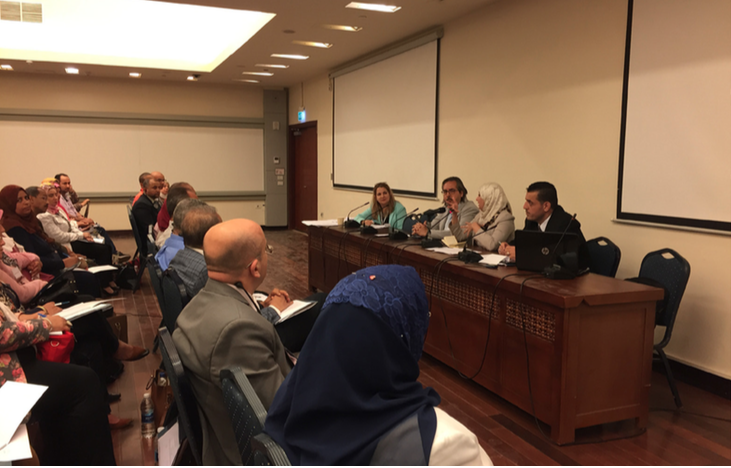UNESCO Symposium Seeks to Incorporate Technology in Public Education
By Dania Akkawi
Follow @daniaakkawi
Technical glitches and problems with the University’s Wifi at a symposium focusing on the role of Open Education Resources (OERs) and Information & Communication Technologies (ICTs) in developing the education of Egyptian Public Schools brought home the challenges that tech-based education must overcome.
The event was delayed for about 45 minutes due to technical difficulties that arose from the lack of translation headphones for the Arabic speaking participants.
The symposium, which is also co-sponsored by United Nations Education, Scientific and Cultural Organization (UNESCO)’s Cairo Office in the Regional Bureau of Sciences in the Arab States, in collaboration with the Graduate School of Education (GSE), looked at ways that teachers can incorporate new communication tools in their classrooms.
A paper survey regarding the use of technology in classrooms was distributed to the audience members to explore how often they use technology in the classrooms, the challenges they face with it and the benefit it brings to the class.
As the typical public school classroom often lacks facilities, OERs can be accessed freely for teaching and learning.
“We look at building the capacity of teachers and to raise awareness on important educational resources by providing them with enough information about OERS so that they know and are prepared to take action to incorporate this into the development of their school and lessons,” Paul Hector, on behalf of Dr.Ghaith Fariz, Director of UNESCO Regional Bureau for Science in the Arab States told The Caravan.
Assistant Professor at the GSE and the Center of Learning and Teaching (CLT), and moderator of the symposium, Gihan Osman said that the event is all about teachers and how they can use these resources to help improve education in Egypt.
Aside from discussing innovative teaching for developing education standards, Chair of the International and Comparative Education Department from the GSE Heba El Degheidy said that they want to hear what the teachers have to say.
“We want to think about the future with you,” said El Degheidy.
The event consisted of two panels; one about the potential for using technology in Egyptian public schools and the second on OERS in particular.
“Both are similar, but we can’t talk about OERS without talking about technology,” said Osman.
Education has evolved to incorporate technology and online resources have become part of the learning experience in classrooms, she added.
However, public schools do not have the facilities and the level of skilled teachers that would allow for the same experience, said Shaimaa Ismail, a technology education specialist in the Egyptian Ministry of Education.
“Out of 54,000 schools in Egypt, if we are going to talk about those qualified enough to use technology, there are about only four,” said Ismail.
Although there are many calls for educational reform in the Arab world due to increasing unemployment levels, there are fears that a change would create a confused identity, added Osman.
“Unemployment in the Arab world is pretty high and this is because our young people often do not have the skills desired and needed in the 21st century, such as creativity, collaboration, communication, critical thinking and digital literacy.”
OERs are supposed to present a solution to the challenges that face public schools by providing them with a toolkit that can keep up with rapidly changing knowledge for the sake of lifelong learning, Hector told The Caravan.
However, the issue remains in the culture and lack of resources that prohibit a move to technology.
Previous education systems prioritized competition and required students to work individually, said Hector.
“The more to OERs represents a paradigm shift asking educators and students to work together to produce joint work,” added Hector.
To go forward with this change in Egypt requires a change in the core of syllabus that does not include technology and rarely incorporates collaborative work.
“In Egypt, we are different…We have a syllabus we must follow… Teachers want to finish this syllabus. At the same time, this syllabus does not include technology. The student is not tested in technology,” said Ismail.
However, Head of the English and Translation Department in Notre Dame University in Lebanon, George Abdelnour, said that simply placing computers will not solve any issues.
“I am not a believer that just putting computers in the classroom will solve the problems we face. You know this. You are educators. With the issue of sustainability and training teachers to keep up with changes, all of this requires a lot of resources and governments aren’t always able to meet that,” said Abdelnour.
The matter of concern in Lebanon is rather with “internal digital divide,” he added.
“You have a system of public education that is administered by the the state and then you have a large, maybe better, more qualified private education sector. My fear is that the digital divide reflects us in that public-private divide in the government,” he said.
OERs, however, are the tool that should transcend the public-private divide, said Hector.
Despite lack of resources and challenges, the general consensus is for educators to unite and come out with something that can be an interface for our country, said Ismail.




